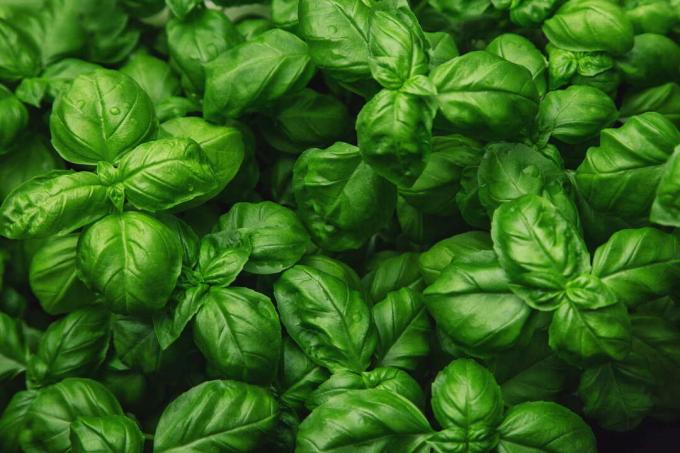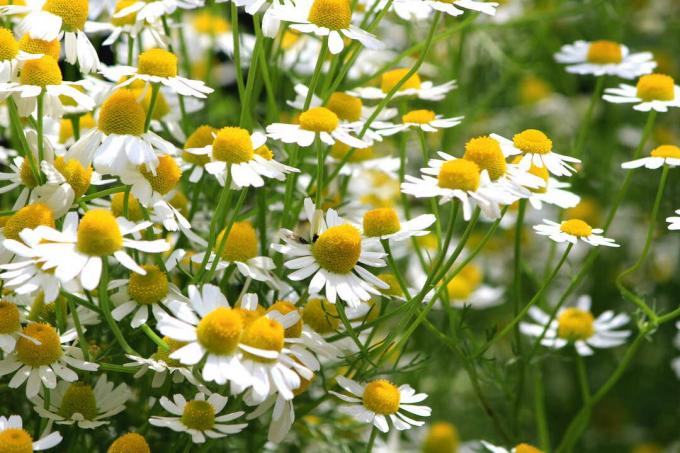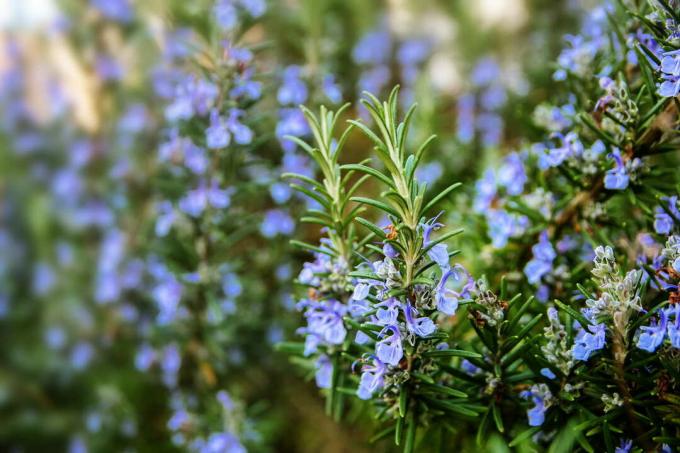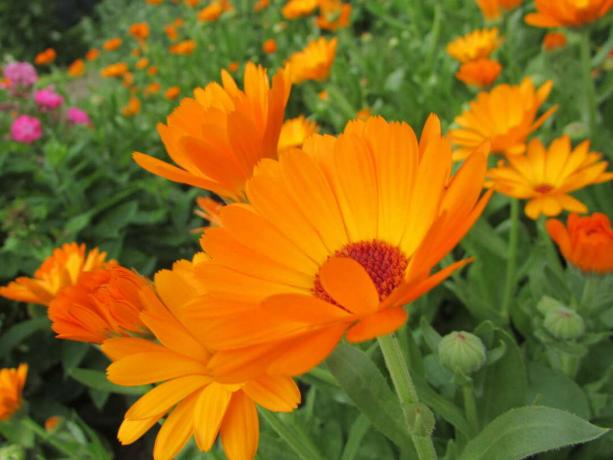Medicine from your own garden? These ten plants feel just as comfortable in the front yard as they do in the pharmacy.

Herbs and medicinal plants are probably the oldest medicine in the world. With their active ingredients, they naturally help against many ailments and support the body. But anyone who thinks that medicinal plants are not only totally outdated, but are also difficult to plant, is wrong. The little helpers often thrive in the home garden without anyone even knowing about their healing power. These ten plants not only fit in every bed, but also enrich every medicine cabinet.
contents
- basil
- lavender
- chamomile
- lemon balm
- feverfew
- rosemary
- marigolds
- thyme
- meadowsweet
- arnica
Notice: Even if the plants have positive effects on health, they do not replace medicines. If you have a serious medical condition or are unsure about dosage and use, please consult a doctor or pharmacist.
basil
basil is not only a hit as a delicious addition to tomatoes and mozzarella. The small kitchen herb also cuts a fine figure as a medicinal plant. The plant has an anti-inflammatory effect and can relieve swelling. In addition, basil with its essential oils helps against many stomach and intestinal complaints. It doesn't matter if you have stomach ache or nausea: Basil helps if you have eaten the wrong food.

lavender
This lilac colored plant can already be found in many gardens and rightly so. Finally he sees lavender not only beautiful, but also has an intoxicating smell. The lavender oil, which is obtained from the fragrant flowers, has a positive effect on the psyche. Anyone who sleeps badly or wakes up at night will be safely accompanied through the night by a few drops of the oil on the pillow or a lavender bath. In addition to its calming effect, lavender is also a real insect repellent. Aphids will avoid plants near lavender, and moths will also stay away from closets with a lavender bag.

chamomile
Who didn't have to drink chamomile tea when they were sick in bed as a child? chamomile is a real classic among medicinal plants and not without reason. It relaxes the muscles in the gastrointestinal tract and thus helps against abdominal pain, has an anti-inflammatory and antibacterial effect. It also banishes bloating and flatulence and is the ideal plant for any type of abdominal pain. Simply brewed as a tea, it helps digestion and looks good in any garden with its yellow and white flowers. However, people who are allergic to daisy should be careful when using chamomile, in rare cases allergic reactions can occur.

lemon balm
lemon balm is a true all-rounder in the garden. Not only does the plant smell particularly good (that's why it is also often referred to as lemon balm), but it is also a pleasure as a spice. Lemon balm is also known as a medicinal plant. It has an anxiolytic and calming effect (similar to lavender). It also relieves gas and bloating and helps the stomach to relax. However, lemon balm essential oil should never be used undiluted as it can irritate the skin and mucous membranes. Instead, a dish with lemon balm is not only delicious, but also protects against stomach ache.

feverfew
is that chamomile Almost, because feverfew not only looks similar to the famous chamomile, but is also related to it. It is therefore not surprising that feverfew can also have a healing effect on the body. In ancient times, the herb was used to treat birth pains, which most likely earned it its name. In English, on the other hand, the plant is called "Feverfew" (loosely translated: Less fever), which indicates its antipyretic effect. In addition, it has an anti-inflammatory effect. Feverfew is easy to take as a tea, even if it tastes extremely bitter. However, caution is advised during pregnancy. Pregnant women should not take the herb as it can promote contractions. People with daisy family allergies should also refrain from using the plant.

rosemary
Hearty dishes and a Mediterranean ambience characterize the image of the rosemary the end. But this popular spice can do much more. Not only its aroma makes it the perfect complement for greasy dishes. Rosemary also prevents gas and bloating that can set in after such a feast. The spice not only stimulates digestion. A bath with rosemary oil also stimulates blood circulation in the skin and gets the circulation going. During a massage, rosemary loosens cramped muscles and can help against sore muscles and back pain.

marigolds
A yellow to orange-red flower dream - marigolds (Calendula officinalis) are grown in many gardens as a decorative element. But the beautiful flower can do much more. If the flowers are used in ointments or creams, they help the skin to heal. The wounds close more quickly and there is less inflammation, which is why the marigold is found in a large number of wound healing ointments. Inflammations in the mouth or throat also benefit from the healing power of the plant. On the other hand, if you have sensitive skin, marigold can cause slight irritation. On the other hand, people with daisy family allergies should avoid using marigolds entirely, because allergic reactions can occur here.

thyme
In addition to rosemary and oregano also belongs thyme to Mediterranean cuisine and it is impossible to imagine a good herb garden without it. The aromatic-smelling shrub not only tastes good: the kitchen spice is also useful when you have a summer flu. The essential oils of thyme loosen stubborn mucus from the lungs and bring relief to stubborn coughs. It also relaxes the bronchial muscles and has an analgesic effect. In this way, the symptoms of acute bronchitis can be alleviated. However, you should never take thyme oil undiluted as it irritates the mucous membrane too much. Small children and asthmatics in particular should not take any essential oils of thyme at all, as this can lead to shortness of breath.

meadowsweet
Was formerly meadowsweet a common medicinal herb, today it is hardly known. But the plant with the sweet smell was wrongly forgotten. Meadowsweet is a real beauty with its filigree flowers on the large inflorescences. It also contains the precursors of salicylic acid. This active ingredient is best known for its sister, acetylsalicylic acid, which is probably a component of the most common drug in Germany: aspirin. Meadowsweet also has an anti-inflammatory effect, reduces fever and relieves headaches and body aches, although not as much as the well-known headache remedy. Meadowsweet also improves cold and flu symptoms and is used in the treatment of osteoarthritis. Others too Herbs for Colds you can grow in your own garden.
Caution: People who are allergic to salicylates (e.g. aspirin) should also not take meadowsweet.

arnica
Almost eradicated - that's how popular it was arnica as a medicinal herb that collecting over centuries led to the destruction of numerous stocks. But stocks have now recovered and with the right care, the bright yellow flower can also thrive in home gardens. As an ointment and tincture, the plant helps against swelling, sprains or bruises and relieves pain, but should never get on open wounds. In homeopathy, too, the plant is often used to treat a variety of injuries. Except in the strong homeopathic dilution, arnica should not be taken. In large quantities, the plant is poisonous and causes vomiting, dizziness, headaches, stomach pains and palpitations. People who are allergic to daisy family and pregnant women should also avoid external use, as allergic reactions can occur.

Would you like to create optimal growth conditions for your medicinal herbs? Then plant them in a high quality organic soil like our Plantura Organic herbal & seed soil. The peat-free substrate is perfectly tailored to the needs of herbs.
Some medicinal herbs have an immune-boosting effect on us humans. Here you will find an overview of Herbs that strengthen the immune system.
